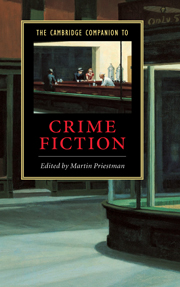Book contents
- Frontmatter
- Introduction
- 1 Eighteenth-century crime writing
- 2 The Newgate novel and sensation fiction, 1830-1868
- 3 The short story from Poe to Chesterton
- 4 French crime fiction
- 5 The golden age
- 6 The private eye
- 7 Spy fiction
- 8 The thriller
- 9 Post-war American police fiction
- 10 Post-war British crime fiction
- 11 Women detectives
- 12 Black crime fiction
- 13 Crime in film and on TV
- 14 Detection and literary fiction
- Guide to reading
- Index
- Series List
1 - Eighteenth-century crime writing
Published online by Cambridge University Press: 28 May 2006
- Frontmatter
- Introduction
- 1 Eighteenth-century crime writing
- 2 The Newgate novel and sensation fiction, 1830-1868
- 3 The short story from Poe to Chesterton
- 4 French crime fiction
- 5 The golden age
- 6 The private eye
- 7 Spy fiction
- 8 The thriller
- 9 Post-war American police fiction
- 10 Post-war British crime fiction
- 11 Women detectives
- 12 Black crime fiction
- 13 Crime in film and on TV
- 14 Detection and literary fiction
- Guide to reading
- Index
- Series List
Summary
The literature of the eighteenth century is suffused with crime, but handles it in a wholly different way from that of the nineteenth and twentieth. Looking back across those centuries, it is easy to trace this difference to the penal realities of the time: the absence of any reliable system of policing, or of the detection of criminals on any routine basis. Furthermore, there seems to have been little ideological belief that this could or indeed needed to be done effectively. What system there was was largely privatised: the 'prosecution' of theft was the responsibility of the injured party, who might offer a reward for information or hire an agent. This situation fed straight into the hands of gangsters such as the notorious Jonathan Wild, who arranged in turn for the robberies, the receipt of the reward for returning the goods and, when it suited him, the arrest of the supposed thieves - usually members of his own gang - in his self-proclaimed role of 'Thieftaker General'. Alternatively, the authorities relied on members of the public to detect crime as it happened and summon the watch - parochially-based and with few autonomous powers beyond responding to calls for arrest.
- Type
- Chapter
- Information
- The Cambridge Companion to Crime Fiction , pp. 7 - 18Publisher: Cambridge University PressPrint publication year: 2003
- 1
- Cited by



